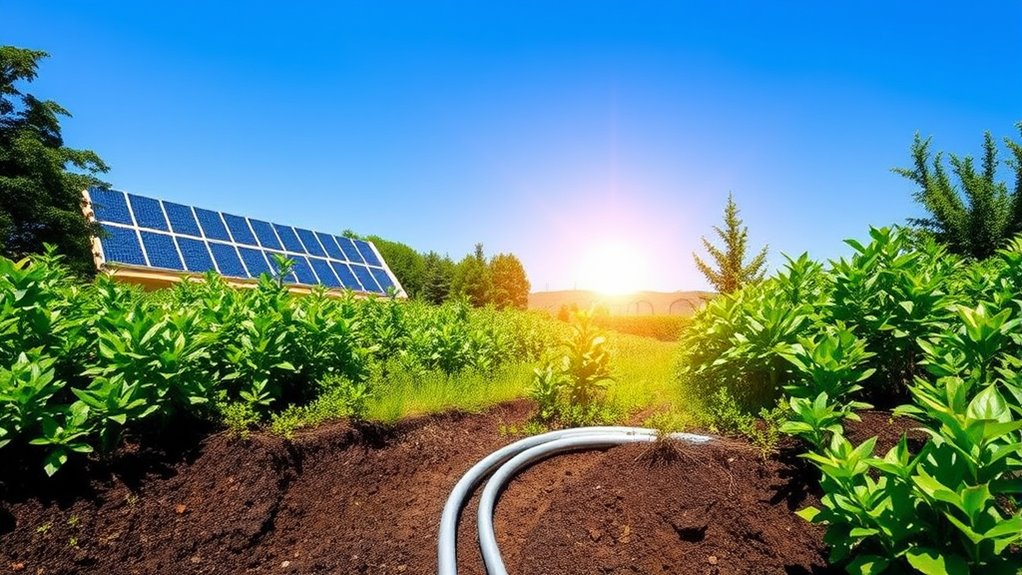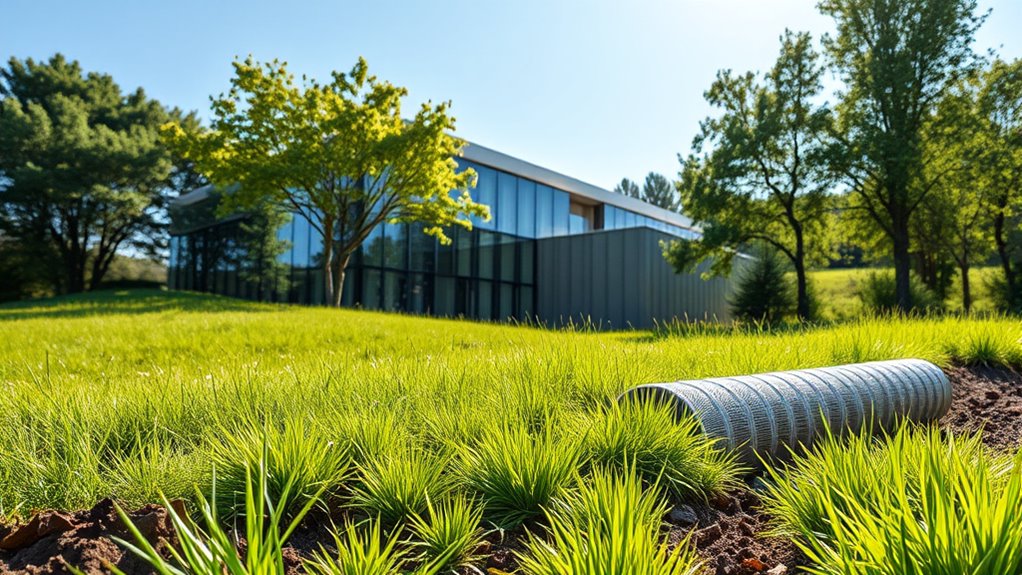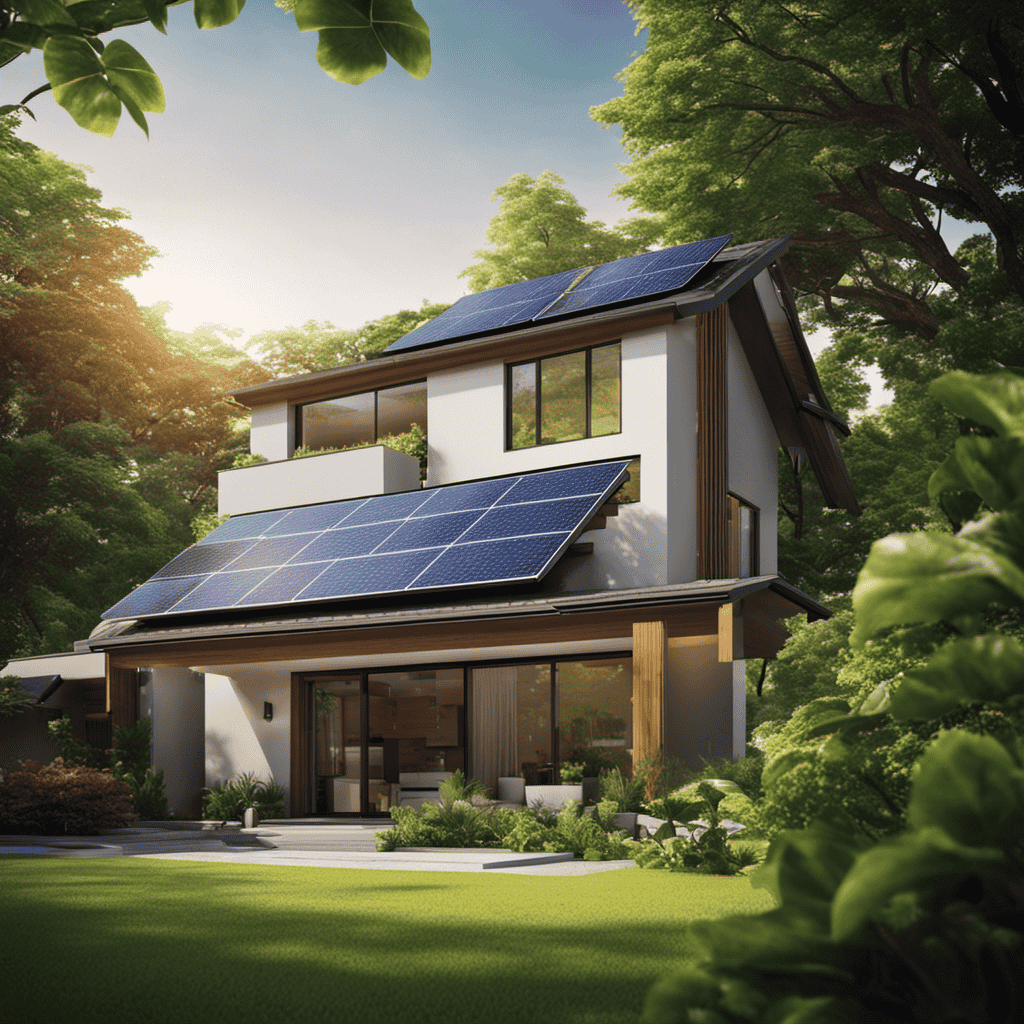Geothermal heat pumps provide a clean, renewable way to heat and cool your home by using the Earth’s steady internal temperature. They substantially reduce your reliance on fossil fuels, cutting harmful emissions and improving air quality. These systems are energy-efficient, operate quietly, and require less maintenance, making them a sustainable choice for the environment. By choosing geothermal, you contribute to lower greenhouse gases and a greener future—discover how more sustainable benefits come with this innovative technology.
Key Takeaways
- Geothermal heat pumps use renewable earth heat, reducing reliance on finite fossil fuels.
- They operate without emissions, lowering greenhouse gases and improving local air quality.
- These systems cut energy consumption, decreasing carbon footprint and supporting climate change mitigation.
- Their durability and low maintenance minimize waste and resource use over time.
- They lessen strain on the energy grid by providing efficient heating and cooling, promoting cleaner energy use.

Geothermal heat pumps offer a sustainable way to reduce your home’s environmental impact by harnessing the stable temperature of the earth to heat and cool your space. Unlike conventional systems that rely heavily on fossil fuels, geothermal technology taps into a form of renewable energy stored beneath the surface. Because the earth maintains a relatively constant temperature year-round, your heat pump can efficiently transfer heat from the ground into your home during winter and reverse the process in summer. This process notably cuts down on energy consumption, leading to lower greenhouse gas emissions and a smaller carbon footprint. By choosing this technology, you’re actively participating in emission reduction efforts, making a positive impact on the environment.
One of the key environmental benefits of geothermal heat pumps is their ability to utilize renewable energy sources. The earth’s internal heat is naturally replenished, so you’re not depleting finite resources like coal or natural gas. This reliance on renewable energy means your home becomes less dependent on fossil fuels, which are major contributors to air pollution and climate change. This shift not only helps reduce your household’s carbon emissions but also lessens the strain on the broader energy grid, which often relies on polluting power plants. As you adopt geothermal technology, you help promote a cleaner energy future, supporting the global transition toward sustainable energy sources.
Additionally, geothermal heat pumps produce very few emissions during operation. Unlike traditional heating and cooling systems that burn fuels and release pollutants, geothermal systems operate quietly and cleanly. They don’t emit carbon dioxide, nitrogen oxides, or sulfur dioxide, which are common byproducts of fossil fuel combustion. This means you’re improving your indoor air quality and contributing to the reduction of harmful pollutants released into the atmosphere. Over time, these cumulative reductions in emissions can substantially impact local air quality and help combat climate change.
Another important aspect is that geothermal systems tend to have a longer lifespan and require less maintenance than conventional HVAC units. This durability means fewer replacements and less waste, further reducing environmental impact. Plus, their high efficiency means you use less energy to achieve the same level of comfort, translating into lower utility bills and even more emission reduction benefits. Overall, by installing a geothermal heat pump, you’re making a smart choice that aligns with sustainable practices, harnesses renewable energy, and actively helps decrease harmful emissions—benefits that extend beyond just your home to the broader environment. A renewable energy source like geothermal heat is naturally replenished, emphasizing its sustainability and importance in reducing our reliance on finite fossil fuels.
Frequently Asked Questions
How Do Geothermal Heat Pumps Affect Local Groundwater Levels?
Geothermal heat pumps generally don’t negatively impact local groundwater levels if installed properly. They help maintain groundwater recharge by relying on the consistent temperature of underground aquifers. When you install a geothermal system, it supports aquifer sustainability because it doesn’t deplete water resources or cause contamination. Proper design and regular maintenance guarantee your system preserves groundwater flow, keeping local water supplies stable and healthy.
Are There Any Noise Concerns With Geothermal Heat Pump Systems?
Think of your geothermal heat pump system as a quiet, underground river flowing beneath your home. Usually, you won’t hear much, but some system noise can occur during operation, especially with older or improperly installed units. Noise concerns are minimal if you select quality equipment and guarantee professional installation. modern systems are designed for near-silence, so you can enjoy warmth and comfort without disruptive noise, like a peaceful stream.
What Is the Lifespan of a Typical Geothermal Heat Pump?
A typical geothermal heat pump lasts around 20 to 25 years, thanks to its system durability. You can expect the underground loops to last even longer, often 50 years or more. Its retrofit potential makes it a smart investment, allowing you to upgrade components over time. Proper maintenance helps extend the lifespan, ensuring your system remains efficient and reliable for many years to come.
Can Geothermal Heat Pumps Be Used in All Climate Zones?
You might think geothermal heat pumps are limited by climate, but that’s not true. They’re incredibly adaptable and work efficiently across all climate zones, from freezing winters to hot summers. Their system efficiency remains high because they leverage the stable underground temperature, making them a reliable choice no matter where you live. So, whether you’re in a mild or extreme climate, geothermal systems can meet your heating and cooling needs effectively.
What Are the Maintenance Requirements for Geothermal Systems?
You need to regularly check your geothermal system to guarantee it runs efficiently. Keep an eye on the system efficiency by cleaning or replacing filters and inspecting the circulating pumps. The component durability is high, but routine maintenance like flushing the loops and checking for leaks helps prolong its lifespan. Scheduling professional inspections every few years also keeps your geothermal heat pump operating at peak performance and helps prevent costly repairs.
Conclusion
By choosing geothermal heat pumps, you become a gardener tending to the Earth’s health, nurturing a sustainable future. These systems tap into the planet’s natural energy, reducing harmful emissions and conserving resources. Imagine your home as a flourishing garden, thriving because you’ve planted the seeds of eco-friendly technology. Every upgrade you make is like watering that garden, helping it grow stronger and more resilient for generations to come. Embrace geothermal heat pumps and let your actions bloom into positive change.









